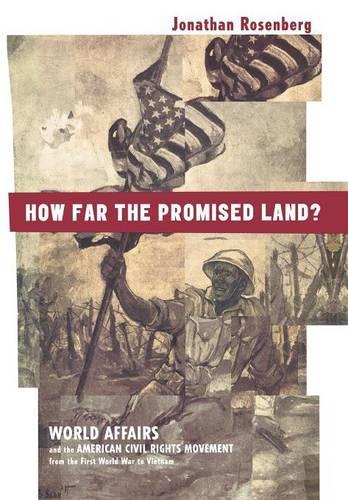
How Far the Promised Land: World Affairs and the American Civil Rights Movement from the First World War to Vietnam
(Hardback)
Publishing Details
How Far the Promised Land: World Affairs and the American Civil Rights Movement from the First World War to Vietnam
By (Author) Jonathan Rosenberg
Princeton University Press
Princeton University Press
2nd January 2006
United States
Classifications
Professional and Scholarly
Non Fiction
Political activism / Political engagement
323.119607300904
Physical Properties
Hardback
336
Width 152mm, Height 235mm
624g
Description
How Far the Promised Land explores the relationship between overseas developments and the most important reform movement in modern American history, the struggle for racial justice. Interweaving civil rights history, U.S. foreign relations history, and twentieth-century international history, the book contributes to the emerging effort to reconceptualize the study of America's past by locating it in a global context. In examining the link between international developments and the quest for racial justice, Jonathan Rosenberg argues that civil rights leaders were profoundly interested in the world beyond America and incorporated their understanding of overseas matters into their reform program in order to fortify and legitimize the message they presented to their followers, the nation, and the international community. The book considers how a cosmopolitan group of black and white, male and female race reform leaders purposively deployed World War I and the peace settlement, the decolonization struggles in Africa and Asia, the emergence of communism and fascism, World War II, and the Cold War to help realize their domestic aspirations.Rosenberg sets this complex story against the backdrop of America's growing activism on the world stage, a development that would have significant positive implications for the domestic struggle. Central to the work is the notion that race reform leaders were animated by the idea of "color-conscious internationalism," a distinctive outlook that would affect the trajectory and momentum of the civil rights movement.
Reviews
"Jonathan Rosenberg, describing 'color-conscious internationalism', demonstrated how the men and women who struggled to win equality for black Americans used world affairs--and especially wars--to advance their cause... Rosenberg does a superb job of analyzing the interplay of world affairs and the quest for racial justice in the United States from 1914 to the 1960s."--Warren I. Cohen, International History Review
Author Bio
Jonathan Rosenberg is Assistant Professor of History at Hunter College of the City University of New York.
